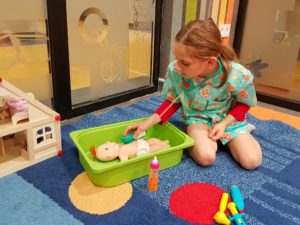What started as an ear infection on a family trip to visit relatives, soon led to one 7-year-old girl needing urgent heart surgery.
This 7-year-old little girl, her twin brother, and parents recently traveled from their home in Italy to visit relatives in the Republic of Georgia. When the little girl started showing signs of an ear infection, her mother quickly brought her to the doctor where they ran different tests, only to discover the child had a congenital heart problem that needed urgent surgery at JoAnn Medical Center.
As soon as the little girl was admitted to the hospital, the mother became overwhelmed with worry on what to expect from her daughter’s initial blood-test procedure. When the psychologists noticed her anxiety, they stepped in, got to know the family, and explained the purpose and benefits of their psychosocial care services and playroom. The mother seemed confused at first as she’d neither heard of nor seen any healthcare professionals in their roles before. The care team never used any excessive restraint or intense interventions on the little girl during her blood-test. Instead, with support from the psychologists, they sat together in the procedure room, watched the iPad, and blew bubbles. The child’s mother caressed her and gently held one of her daughter’s hands as the psychologists explained what they were doing step by step. The little girl was given choices throughout the blood test and occasionally watched what was going on.
One of the psychologists, Tamta, said, “The little girl was wonderful with us; we played, talked, prepared for and walked through the procedure together. I remember how she looked at the medical equipment (ECG, pressure measurer, needles) from afar. With patience and explanations, and with mom’s support and comfort positioning, the little girl did very well through her procedure.” After the blood test, the little girl, her mother, and the psychologists spent time having fun in the playroom. The mother later told the healthcare team she was grateful for the procedural support and play options the psychologists gave her daughter.
The day after the blood test, the psychologists walked with the little girl and her mom to the surgery. Unfortunately, the psychologists weren’t allowed in the operating room with the little girl, so they stayed with her mom and helped her process her emotions. After reuniting the child with her mother post-surgery, the psychologists brought out the child’s favorite toys to normalize the environment and she immediately began playing. She got to meet other patients in the playroom who played with her, cared about her, and shared their experiences with her.
For a 7-year-old girl who spoke a different language than the healthcare team, visiting JoAnn Medical Center was a magical experience for her where she felt safe and calm – she made several friends and even taught the care team some Italian.
Tamta from JoAnn Medical Center said, “Without Standish Foundation for Children, the experience for so many children would not be so positive. Every day we have children for procedures and surgeries who do not want to leave the hospital because they’re so happy with the play opportunities, and they feel safe and sound at the hospital.”

